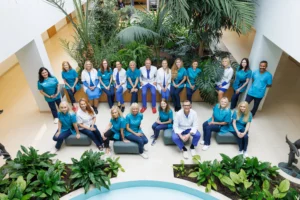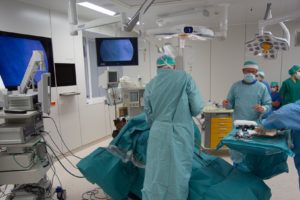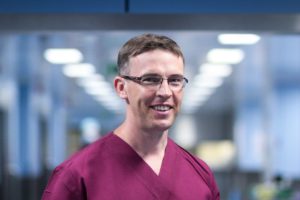What happens before, during and immediately after bariatric surgery
Answered by Dr Ilmar Kaur, Bariatric Services surgeon

Dr Kaur, once the surgery decision has been made, what procedures do the patients have to go through before the surgery?
We get the main information about the patient’s state of health when they fill in a long and thorough questionnaire. This may seem bothersome, but this information is essential for a safe treatment. All the patients must give pre-operative blood samples including for the determination of both vitamin and iron levels, as they need to be monitored after surgery and it is always useful to compare the results before and after surgery.
We perform preoperative gastroscopy for all patients and ECG for patients older than 50. Other examinations, such as ultrasound and X-rays, and consultations with other specialists like cardiologist, for example, are performed as clinically indicated.
Endoscopy or gastroscopy is one of the things that the patients fear the most. Is it really necessary?
Gastroscopy is necessary to rule out various diseases of the oesophagus, stomach, and duodenum, such as tumours, ulcers, and polyps. To spare patients from the unpleasant procedure, we do it under general anaesthesia just before the operation.
What happens if something unexpected is found in the process?
Then the operation will be cancelled until the circumstances are clear. The risk of such an unexpected finding is 1:100, i.e. as a rule, we usually do not find anything that would be a contraindication to the operation.
What is a preoperative diet and why is it necessary?
The goal of the preoperative diet is to lose 5-6 kg in a short time. Rapid weight loss first gets rid of the fat in the liver and thus reduces the liver’s size. This simplifies and speeds up the surgery, because a large and fatty liver literally lies on the stomach and it can be a challenge to push it out of the way during the surgery.
The usual preoperative diet lasts for 2 weeks and means about 1000 kcal consumption per day. No diet is required for patients with a body mass index below 35.
If the preoperative diet fails, will the surgery be cancelled?
No, but the surgery is likely to take longer. This is not so much of a problem for the patient as it is for the surgeon.
What happens in the hospital?
Patients come to the hospital in the morning of the day of the surgery, we usually operate 5 patients a day, unfortunately we cannot perform surgery on everyone at once, so, everyone cannot be first on the list. The operation is always performed under general anaesthesia and is laparoscopic, i.e. it is performed through small holes, essentially 5 pencil-sized instruments are inserted into the abdominal cavity, and the operation lasts around 40-60 minutes. You should get out of bed and walk for 1.5-2 hours after the operation, you can drink water immediately, provided there is no nausea or vomiting.
How long do you have to be in the hospital after the surgery?
Today 80% of patients will be discharged the next day. Until a few years ago patients were hospitalised for 2-3 nights.
If the patient is ready to leave the hospital, but cannot return home yet (flight or ferry tickets, wants to spend some time in Tallinn, etc.) it is possible for them to stay at the hotel next to the hospital.
How come? Do the patients heal faster nowadays?
You could say that, indeed. The reasons why patients stay in the hospital for a long time after the surgery are usually related to coping with the uncomfortable pain and inability to eat or drink orally, especially after a gastrointestinal surgery. We have systematically and critically reviewed all procedures done with the patients in the hospital to reduce the patient’s suffering and ensure faster recovery, we call this the Fast Recovery Program.
Fast Recovery Program – what does it mean?
Its main purpose, as I said, is to reduce the patient’s surgery-related discomfort and suffering. The result is that patients operated on today do not feel pain tomorrow, they are able to drink enough and, for example, drive home, even to another part of Estonia, and, most importantly, their treatment is safer, and the risk of complications is lower. Achieving this is due to many small changes in the daily treatment practice and the systematic implementation of these changes.
Could you give examples?
A positive attitude, encouraging the patient, alleviating fears, explaining what is happening, well-thought-out and consistent pain management, avoiding side effects, quick activation of patients, abandoning useless practices that give discomfort to the patients: e.g. abdominal drains, injections, bladder catheters, and probes. As well as high-quality surgery, permission to consume fluids immediately and so on. And back to the basics: communication, explanation, encouragement, and reassurance. All in all, creating an environment that accelerates and supports healing.
Aren’t the patients afraid to go home the next day after a major surgery?
If it is not necessary to be in the hospital, the patient always feels better at home. We communicate very actively with the patient after they leave the hospital and are just a phone call away when the patient needs it. I must say that although I give all patients my phone number, I get urgent or unexpected calls 3-4 times a year in such situations. Patients do well at home, and unexpected situations are rare.
When is it possible to go to work or exercise?
Depending on the job, 2 weeks of sick leave is sufficient for office work, 3-4 weeks for work requiring long travel or physical work. Patients can start doing their daily home chores immediately, but they need extra time to get used to the new situation, especially the diet. This extra time is usually not available in the work environment, so I recommend taking 2 weeks of sick leave even when working in an office.
Physical activity can and must begin immediately after surgery, and the load and intensity should gradually increase. As a rule, most of the restrictions will end about 1 month after the surgery.




